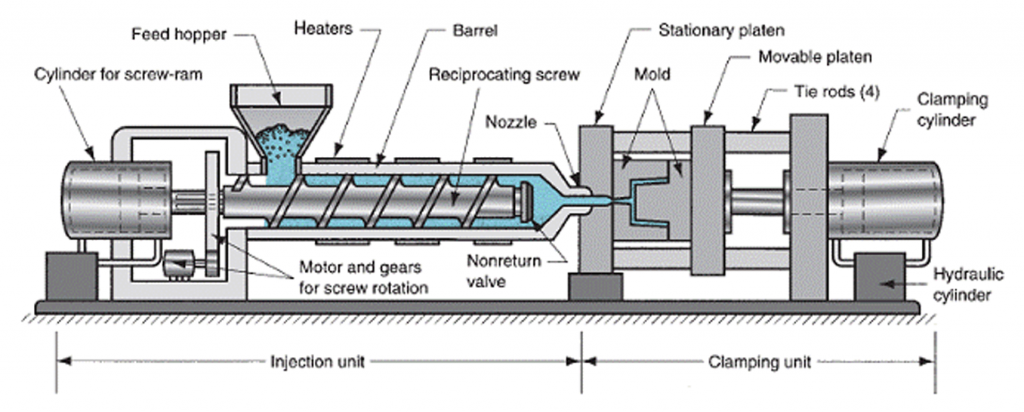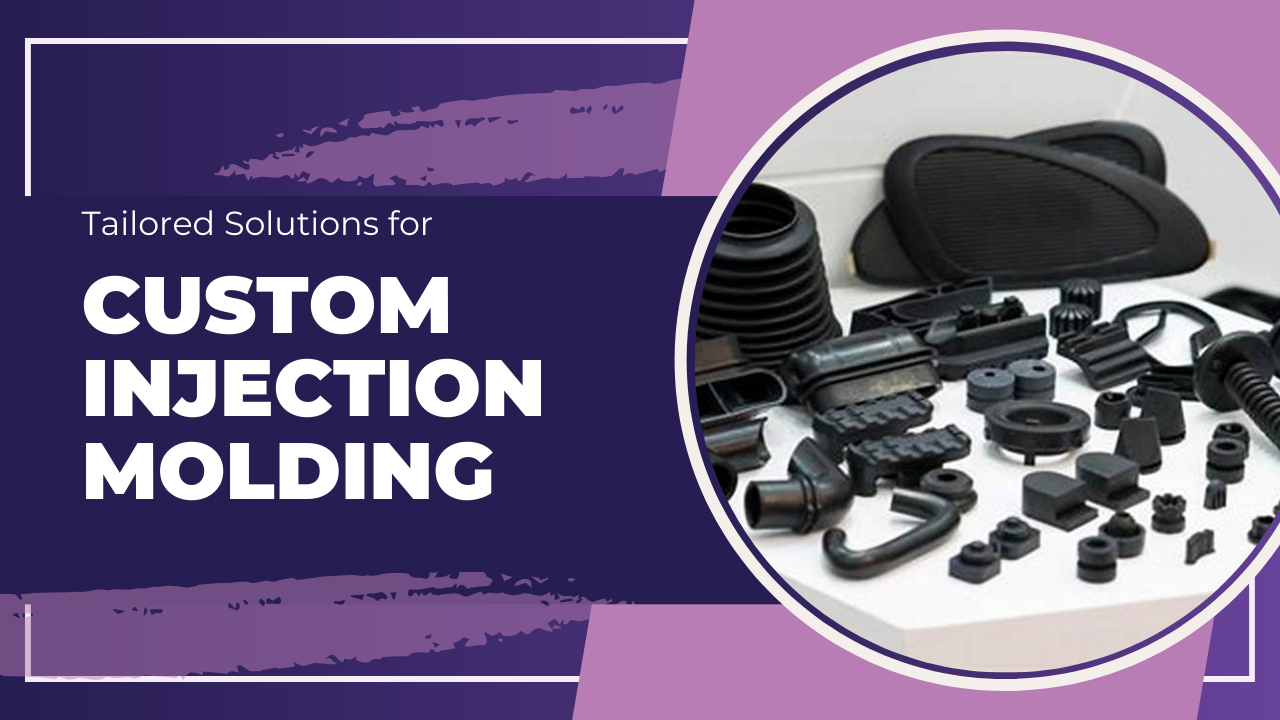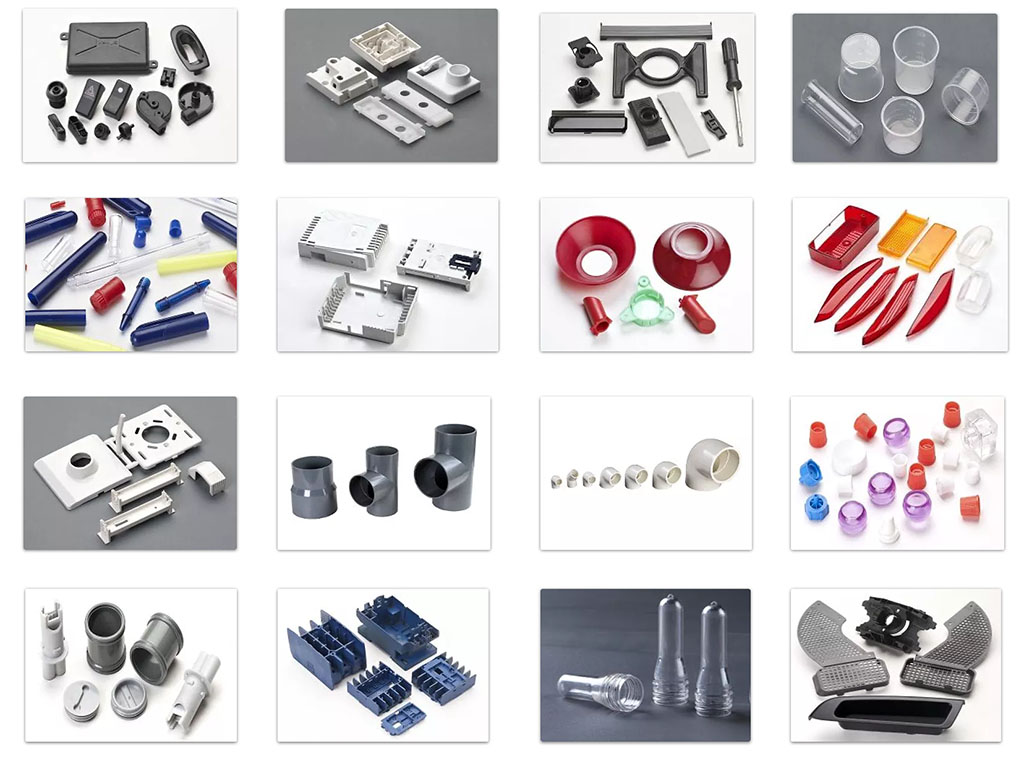When standard parts don’t meet your needs, custom injection molding is the answer. It allows you to create parts with the exact shape, size, and material your product requires. Custom injection molding ensures you get components that perfectly fit your unique specifications.
Custom injection molding allows you to create parts and components that are precisely tailored to your needs, whether you’re in the automotive, medical, consumer products, or electronics industry. This blog will dive into how these solutions work, their benefits, and why they’re the perfect fit for companies seeking precision, quality, and reliability.

What is Custom Injection Molding?
Custom injection molding is a process used to manufacture parts by injecting molten material into a mold. Unlike standard injection molding, which often uses generic molds and materials, custom injection molding focuses on creating unique molds and selecting materials that meet specific project requirements. This method enables the creation of complex structures with high precision and consistency, making it appropriate for businesses that require customized solutions.
Why is Customization Important?
Customization is essential since it enables producers to satisfy the unique requirements of their clients. For instance, a vehicle manufacturer may want a robust yet lightweight component to increase fuel economy. A medical device manufacturer may require a component that meets strict biocompatibility standards. In both cases, standard parts won’t do the job, but custom injection molding can produce the exact parts needed.
Key Benefits of Custom Injection Molding Solutions
When considering a manufacturing process for your products, it’s important to understand the specific advantages it offers. Custom injection molding solutions differ from conventional approaches with several advantages. These advantages are not only about producing parts but also about how they contribute to the overall success of your project, whether it’s through precision, material choice, or cost efficiency.
Precision and Accuracy
One of the most significant benefits of custom injection molding is the precision and accuracy it offers. Custom molds are designed to create parts with tight tolerances, meaning the dimensions of the parts are extremely close to the desired measurements. This is crucial in industries like electronics, where even a small deviation can lead to malfunctioning products.
Material Flexibility
Custom injection molding solutions also provide a variety of material alternatives. Different materials might be chosen to satisfy specific needs depending on the application. For instance, thermoplastics are often chosen for their durability and flexibility, while elastomers are used when parts need to be soft and flexible. The capacity to select the appropriate material for the task guarantees that the finished product functions as planned in the intended setting.
Cost Efficiency
While custom injection molding may seem like a more expensive option initially, it can be very cost-effective in the long run. After the mold is made, it can be used to reliably generate millions or even thousands of parts. Production expenses are lowered and waste is decreased by this consistency. Furthermore, no additional alterations or adjustments are necessary because the parts are manufactured to the precise specifications needed, saving time and money.
Scalability
Custom injection molding solutions are highly scalable. Whether you need a few prototypes or a large-scale production run, the process can be adjusted to meet your needs. This flexibility is particularly beneficial for businesses that need to ramp up production quickly without sacrificing quality.

Custom Injection Molding Solutions Tailored to industry Specifications
Custom injection molding is not a one-size-fits-all solution. Different industries have unique requirements that demand specialized knowledge, materials, and techniques. Understanding these individual requirements is critical for providing effective solutions that fulfill the demanding standards of various industries. Let’s dive into the technicalities and specific custom injection molding requirements for key industries.
Automotive Industry
The automotive industry is highly competitive and driven by the need for innovation, efficiency, and safety. Custom injection molding plays a critical role in this industry by enabling the production of complex, lightweight, and durable components. These parts are essential for reducing vehicle weight, improving fuel efficiency, and ensuring the safety and reliability of vehicles.
Technical Requirements:
- Material Selection: The automotive industry often requires materials that are not only lightweight but also have high tensile strength, heat resistance, and chemical stability. Engineering-grade thermoplastics such as polyamide (nylon), polycarbonate, and polybutylene terephthalate (PBT) are commonly used. These materials offer the necessary mechanical properties and can withstand the harsh conditions within a vehicle, such as exposure to high temperatures, chemicals, and mechanical stress.
- Precision and Tolerances: Automotive parts must meet extremely tight tolerances to guarantee correct fit and performance. This precision is especially important for components such as engine parts, fuel systems, and connectors. Custom injection molding allows for the creation of parts with complex geometries and intricate details, ensuring that they meet the stringent requirements of automotive manufacturers.
- Durability and Longevity: Automotive parts must be designed for longevity. They need to endure millions of cycles of operation without degrading. Custom injection molding allows components with reinforced structures, such as fiber-filled thermoplastics, which enhance the durability and performance of the final product.
Medical Industry
The medical industry demands the highest standards of precision, safety, and biocompatibility. Components used in medical devices must meet strict regulatory requirements and be manufactured in controlled environments to ensure they are free from contaminants. Custom injection molding is essential for producing medical parts that meet these rigorous standards.
Technical Requirements:
- Biocompatibility: Medical gadgets frequently come into direct contact with the human body, both outwardly and inwardly. This necessitates the use of biocompatible materials that do not produce side effects. Materials such as medical-grade silicone, polyethylene, and polycarbonate are commonly used in custom injection molding for medical applications. To prevent contamination, cleanroom facilities are required for medical component production.
- Sterility: The production of medical components must take place in cleanroom environments to prevent contamination. Custom injection molding facilities for medical parts are equipped with advanced filtration systems and adhere to strict cleanliness protocols. Additionally, the molds themselves must be designed to minimize crevices and other areas where contaminants could accumulate.
- Precision: Medical devices often require components with extremely tight tolerances, especially for parts used in diagnostic equipment, surgical instruments, and implantable devices. These parts fit together precisely because of the accuracy provided by custom injection molding, which lowers the possibility of device failure and enhances patient outcomes.
Consumer Products
The consumer products industry covers a wide range of items, from household goods to electronics and personal care products. Custom injection molding is utilized in this industry to produce parts that are not only economical and functional but also aesthetically beautiful.
Technical Requirements:
- Aesthetics and Surface Finish: Consumer products often require a high level of visual appeal. This means the parts need a smooth, blemish-free surface finish and consistent color and texture. Custom injection molding allows for techniques like over-molding, which combines different materials to achieve desired aesthetic and tactile properties. Additionally, various finishing processes, like texturing and painting, can be applied directly within the mold to reduce post-production steps.
- Material Versatility: The wide range of applications in consumer products necessitates the use of diverse materials. From flexible thermoplastic elastomers for soft-touch grips to rigid polycarbonate for durable casings, custom injection molding provides the flexibility to select and combine materials that meet specific functional and aesthetic requirements.
- Cost Efficiency: Given the competitive nature of the consumer products market, cost efficiency is paramount. Custom injection molding enables the production of high volumes of parts with minimal waste, reducing overall production costs. Multi-cavity molds are often used to produce multiple parts simultaneously, further increasing production efficiency.
Electronics Industry
The electronics industry is characterized by rapid innovation and the need for precise, reliable components. Custom injection molding is integral to producing parts that meet the exacting demands of electronic devices, which often involve miniaturization, high-performance materials, and complex geometries.
Technical Requirements:
- Miniaturization and Precision: Electronics require small, intricately designed components that fit together with extreme precision. Micro-molded components including housings, switches, and connectors—which are necessary for contemporary electronic devices—can be produced using custom injection molding. Tight tolerances are required for these pieces to guarantee correct mechanical fit and electrical connections.
- Electrically Insulative Materials: To ensure the safety and proper operation of the gadget, many electronic components must be constructed from materials that offer electrical insulation in order to prevent short circuits. Thermoplastics such as polyphenylene sulfide (PPS) and liquid crystal polymer (LCP) are commonly used in custom injection molding for their excellent insulating properties and ability to withstand high temperatures.
- Thermal Management: Thermal management has grown to be of utmost importance as electronic equipment becomes more powerful and efficient. Custom injection molding can be used to create heat sinks and other thermal management components from materials like thermally conductive plastics, which help dissipate heat and maintain the performance of the device.

Case Studies: Real-World Applications
To understand the real impact of custom injection molding solutions, it helps to look at specific examples from various industries. These case studies highlight how custom solutions can address unique challenges and deliver outstanding results that standard methods simply can’t achieve.
Case Study 1: Automotive Parts Manufacturer
A major automotive parts manufacturer faced a challenge: they needed to reduce the weight of their vehicles to meet new fuel efficiency standards. However, the parts they required had complex shapes that couldn’t be produced with standard injection molding. By turning to custom injection molding solutions, they were able to create lightweight components made from advanced thermoplastics. These parts not only reduced the vehicle’s weight but also maintained the necessary strength and durability.
Case Study 2: Medical Device Producer
A medical device company needed components for a new product that required strict biocompatibility and precision. Off-the-shelf parts were not an option due to the unique specifications of the device. Custom injection molding allowed them to create parts using medical-grade materials, ensuring that the final product was safe, reliable, and met all regulatory requirements.
Conclusion
Custom injection molding delivers unmatched precision and flexibility across industries like automotive, medical, and electronics. This process ensures that tailored components meet the highest quality standards. Partnering with experts in custom injection molding guarantees superior product performance. If you’re ready to explore how custom injection molding can benefit your business, contact Frigate today.




